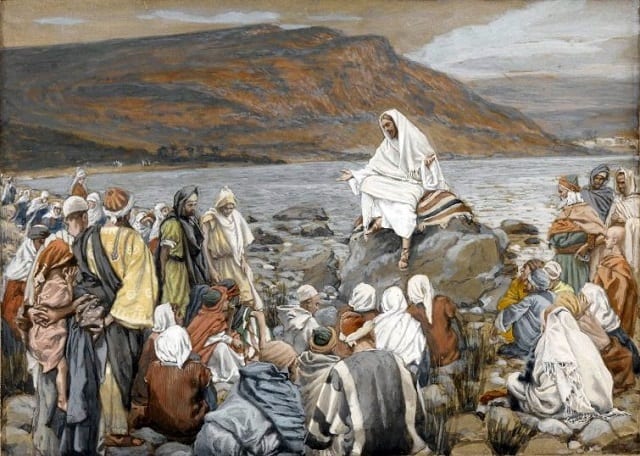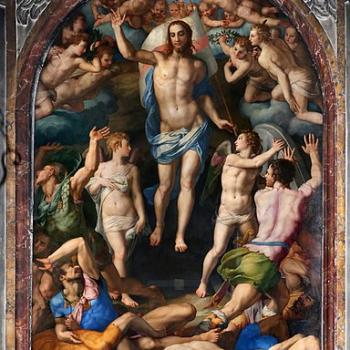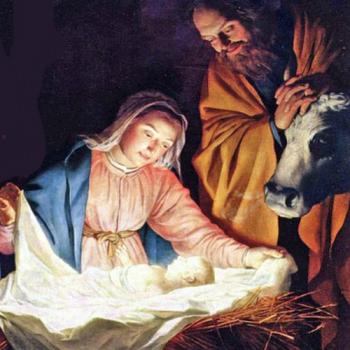
This is an installment of my replies to a series of articles on Mark by Dr. David Madison: an atheist who was a Methodist minister for nine years: with a Ph.D. in Biblical Studies from Boston University. His summary article is called, “Not-Your-Pastor’s Tour of Mark’s Gospel: The falsification of Christianity made easy” (Debunking Christianity, 7-17-19). His words will be in blue below.
Dr. Madison has utterly ignored my twelve refutations of his “dirty dozen” podcasts against Jesus, and I fully expect that stony silence to continue. If he wants to be repeatedly critiqued and make no response, that’s his choice (which would challenge Bob Seidensticker as the most intellectually cowardly atheist I know). I will continue on, whatever he decides to do (no skin off my back).
Dr. Madison believes we are not at all sure whether Jesus in fact said anything recorded in the Gospels. The atheist always has a convenient “out” (when refuted in argument about some biblical text) that Jesus never said it anyway and that the text in question was simply made up and added later by unscrupulous and “cultish” Christian propagandists.
I always refuse to play this silly and ultimately intellectually dishonest game, because there is no way to “win” with such a stacked, subjective deck. I start with the assumption (based on many historical evidences) that the manuscripts we have are quite sufficient for us to know what is in the Bible (believe it or not).
Dr. Madison himself — in his anti-Jesus project noted above, granted my outlook, strictly in terms of practical “x vs. y” debate purposes: “For the sake of argument, I’m willing to say, okay, Jesus was real and, yes, we have gospels that tell the story.” And in the combox: “So, we can go along with their insistence that he did exist. We’ll play on their field, i.e., the gospels.” Excellent! Otherwise, there would be no possible discussion at all.
*****
Dr. Madison called this installment: “Please Tell Me Jesus Didn’t Say That: The gospel writer pushed history off the page” (7-27-18)
The Purpose of the Parables
At the opening of Mark 4 we read that Jesus, sitting in a boat, was preaching to a large crowd on the land. In fact, this is the first time that Jesus is depicted telling a parable. It is commonly known as the Parable of the Sower. Jesus points out that some of the seed lands on the path, some in rocky soil, some among thorns—and finally some in good soil, which yields abundant produce. Jesus concludes, “He who has ears to hear, let him hear.”
That’s it?
The folks in the big crowd probably knew what sowers did, and they might have thought, “Gee, what a sloppy guy. Be more careful where you throw the seed! So, what’s your point Jesus?” We’re told in earlier chapters that many people flocked to see Jesus because he healed a lot of people—they wanted to just touch his garments—and he cast out demons. We hear in Mark 1:27 that they raved about his new teaching.
But this parable of the sower could not have failed to disappoint. Why would his listeners not have said, “So what?”
Church folks, who have probably heard dozens of sermons based on this parable—and its explanation a few verses later—nod knowingly. But the crowd that supposedly heard Jesus wasn’t told the explanation. Bizarrely enough, that’s part of Mark’s plot. In vv. 10-12, we read that, when Jesus was alone with the disciplines and other followers, he told them:
“To you has been given the secret [or mystery] of the kingdom of God, but for those outside, everything comes in parables; in order that ‘they may indeed look, but not perceive,
and may indeed listen, but not understand;
so that they may not turn again and be forgiven.’”
Did I read that right? This is even a quote from Isaiah 6:9-10, presumably to give it more clout. Jesus confides to his inside circle that he doesn’t want outsiders to perceive, understand his message and repent. He seems to be referring to the common rabble, those great throngs of people who came out to hear him preach.
But this doesn’t make sense. Jesus doesn’t want them to repent?
This is such a contrast to what we read elsewhere. In Mark 1:38, Jesus says, “Let us go on to the neighboring towns, so that I may proclaim the message there also; for that is what I came out to do.” And in 2:17 Jesus declares, “Those who are well have no need of a physician, but those who are sick; I have come to call not the righteous but sinners.” Why would he then tell those closest to him that he uses parables to keep people in the dark?
Yes, of course, Mark got it wrong, and seems to have overlooked his blunder. Or maybe not. He might have known exactly what he was doing, and didn’t care all that much about consistency. . . .
In verses 33-34 he returns to the promise that knowledge of God’s Kingdom is for the few:
“With many such parables he spoke the word to them, as they were able to hear it; he did not speak to them except in parables, but he explained everything in private to his disciples.” . . .
Let’s just hope that no one succeeds in proving that Jesus didn’t want sinners to repent and be forgiven. That would be a setback for the What-Would-Jesus-Do crowd.
I have already thoroughly disposed of this groundless and clueless objection in my paper, Madison vs. Jesus #7: God Prohibits Some Folks’ Repentance?
Apologists can also deal with the challenge of squaring “he did not speak to them except in parables” with John’s gospel, in which Jesus doesn’t tell any parables at all.
Yeah, I did that in installment #1 of this series, but for convenience’ sake, I’ll paste it here again:
That’s correct. But Jesus does talk (as recorded in the Gospel of John) in many metaphorical or proverbial (non-literal) ways that bear resemblance to the synoptic parables. For example:
John 2:19-21 (RSV) Jesus answered them, “Destroy this temple, and in three days I will raise it up.” [20] The Jews then said, “It has taken forty-six years to build this temple, and will you raise it up in three days?” [21] But he spoke of the temple of his body.
John 3:8 The wind blows where it wills, and you hear the sound of it, but you do not know whence it comes or whither it goes; so it is with every one who is born of the Spirit.
John 4:13-14 Jesus said to her, “Every one who drinks of this water will thirst again, [14] but whoever drinks of the water that I shall give him will never thirst; the water that I shall give him will become in him a spring of water welling up to eternal life.”
John 6:35 Jesus said to them, “I am the bread of life; he who comes to me shall not hunger, and he who believes in me shall never thirst.
John 10:11 I am the good shepherd. The good shepherd lays down his life for the sheep. (see also 10:1-10, 12-18, including Jesus calling Himself “the door” three times)
John 11:12-14 But if any one walks in the night, he stumbles, because the light is not in him.” [11] Thus he spoke, and then he said to them, “Our friend Laz’arus has fallen asleep, but I go to awake him out of sleep.” [12] The disciples said to him, “Lord, if he has fallen asleep, he will recover.” [13] Now Jesus had spoken of his death, but they thought that he meant taking rest in sleep. [14] Then Jesus told them plainly, “Laz’arus is dead;”
Then follows this warning, vv. 24-25:
[Jesus] said to them, “Pay attention to what you hear; the measure you give will be the measure you get, and still more will be given you. For to those who have, more will be given; and from those who have nothing, even what they have will be taken away.”
I’ll leave it to the zealous apologists to make Jesus look good on this one. Mark’s script, trying to keep the Jesus cult intact, sets the tone for countless cult leaders to come: folks were expected to give full commitment to the cult, and they will lose everything if they didn’t.
Dr. Madison employs his usual tarnishing of Christianity as a bizarre, mind-controlling “cult.” “Cult” might even very well be his favorite word in the English language. I’m afraid it’s much simpler than that (no one need resort to arbitrary conspiracy theories and poisoning the well). Jesus is merely saying that if we don’t act upon the grace that God gives us, then we are in danger of losing everything: meaning that we will lose salvation and be damned.
This is the whole point of Christianity: ultimate salvation and going to heaven to be in union with God forever: just as God always intended for His children that He created (because this will give us unimaginable — the highest possible — joy and happiness for all eternity, since we were made for it). But He also didn’t want to create robots with no free will; so that free will is what opens up the possibility of rejection of God, and thus (failing repentance) winding up in hell, separate from Him, by deliberate choice, for all eternity.
Mark continues his theme of the seed being the Kingdom of God. In vv. 26-29 he uses the imagery of seed sprouting and growing, resulting in a good harvest, and in vv. 30-32 the Kingdom of God is compared to a mustard seed that will grow into an enormous bush. He seems to want to assure his followers that their hope for the Kingdom would have a big payoff.
Nonsense. All Jesus is saying here is that evangelism — spreading the Gospel — will bear great fruit. He’s not talking about personal gain (economic or otherwise). What started as a small band of twelve disciples (eventually minus the one betrayer) would grow and grow to the size it is today:
With around 2.3 billion adherents, split into three main branches of Catholic, Protestant, and Eastern Orthodox, Christianity is the world’s largest religion. The Christian share of the world’s population has stood at around 33% for the last hundred years, which means that one in three persons on Earth are Christians. . . . According to a 2015 Pew Research Center study, within the next four decades, Christians will remain the world’s largest religion; and by 2050, the Christian population is expected to exceed 3 billion. (Wikipedia, “Christianity: Demographics”)
How’s that for a true prediction?
***
Photo credit: Jesus Teaches the People by the Sea, by James Tisot (1836-1902) [public domain / Wikimedia Commons]
***













